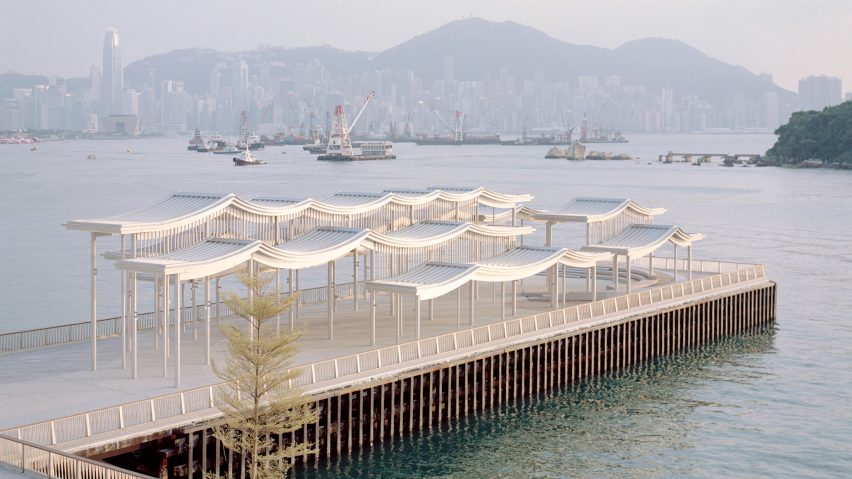Local studio New Office Works has stretched a wavy canopy across the Cheung Sha Wan promenade in Hong Kong.
Located on a harbour on the west side of the Kowloon Peninsula, the waterside Cheung Sha Wan Pier Canopy was designed to echo the arrangement of boats across the waterfront and comprises a series of undulating roofs that rest on poles set at staggered heights.
"The core concept of the design was driven by two elements integral to the site context – the boats and the water," studio co-founder Evelyn Ting told Dezeen.
The canopy, which stretches over a pier that extends from the main promenade, is also intended to reference the historical use of the waterside area.
"Historically, the disused pier had been used for offloading cargo, with the docking of the boats appearing like an extension of the pier itself," Ting continued.
"The design of the pier canopy makes reference to this informal pattern of aggregation, while also breaking up the mass of the roof."
As well as drawing from the harbour's past, the design references its on-land surroundings. Its curved roof modules mirror the distinctive barrel roof profile of a modernist, 1960s vegetable market that previously occupied the waterfront before being moved inland.
Adding to a wider waterside redevelopment plan, New Office Works designed the canopy to offer shading and new life to the pier.
Underneath the shelter, the space was kept open, except for an area of tiered seating at the end of the pier.
"Aside from providing shade, the canopy serves a space for informal gatherings and diverse activities such as fishing, picnicking and yoga," said Ting. "Stepped seating at the end of the pier gives visitors an open view of both the Hong Kong and Kowloon skyline."
Repeating dipped sections make up each strip of the pier canopy, joining to create an undulating, scalloped form. Reflective aluminium panels line the underside of the canopy, while a standing seam roof sits on top.
A steel structure comprising a series of columns and curved beams supports the canopy, which is divided into five parallel strips. Between each section of the roof, slim voids create ventilation and a play of light in the space underneath.
"The variation in roof levels creates voids that allow for passive cooling and cross-ventilation," said the studio.
"Throughout the day, sunlight penetrates the shelter creating an interplay of light and shadow. At night, interior light seeps through the gaps between the roofs, leaving a distinctive profile floating above the water."
"We hope the new pier canopy will attract people to the waterfront promenade," said Ting.
Other canopies recently featured on Dezeen include a shading structure made from mass-timber pyramids and a cloud-like canopy of complexly woven bamboo strips.
The photography is by Rory Gardiner.

